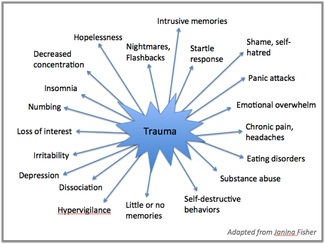Understanding Trauma
The event isn't the trauma. Your response to the event or events is the trauma. This is why telling the story of the event over or over again does not eliminate symptoms. Being focused in the present, understanding your personal trauma response and working toward safe and emotional regulation reduces the impact that trauma has on your life on a day to day basis.
|
Group Therapy
|
One of the most effective treatments for the trauma response is group therapy. Trauma survivors often feel isolated, unsafe and misunderstood. The realization that there are others who are experiencing the same symptoms that you are experiencing, even though they may have survived a different event, is healing in itself. Clients do not share their trauma event stories in group because reliving the event contributes to emotional disturbance, not healing. Group is a 100% safe environment, 100% of the time. A haven for being understood while expressing your emotion.
I offer Group Therapy when there are a sufficient number of interested individuals.. These are closed groups, meaning once a group cycle starts, no new members join until the next cycle starts. Each cycle is 4 weeks. A minimum commitment of 4 weeks is required to participate. Group size is limited to 6. Personal, without being too intense. |
Individual Therapy
|
Individual therapy can be an adjunct to group therapy, or it can be a stand alone service. You may elect to choose to work on a very directed target like " reduce or eliminate flashbacks", or " reduce or eliminate intrusive thoughts".
It is possible to feel better without retelling your trauma story. You may share all or some or none of the details of the events you have survived. If beginning therapy is overwhelming, consider starting with the symptoms that are getting in the way of living your life in a safe and productive manner. |
